
Top 11 Moodle Alternatives and Competitors in 2026
Moodle has powered online learning for two decades, but the way we build, deliver, and monetize learning has undergone significant changes. In 2026, course creators, corporate L&D teams, schools, and training firms need platforms that are simpler to run, faster to launch, and smarter out of the box.
That’s where modern Moodle alternatives come in: hosted, plug-and-play LMSs that trade endless plugin wrangling for built-in ecommerce, AI content tools, collaborative authoring, mobile apps, and crisp analytics.
If you’re here, you’re likely wrestling with at least one of these headaches:
- A steep Moodle learning curve for non-technical admins
- Plugin and hosting upkeep that keeps piling onto your to-do list
- Limited reporting unless you bolt on extras
- Unclear support responsibilities when something breaks
Competitor research mirrors these pain points, consistently calling out Moodle’s complexity, plugin maintenance burden, thin default analytics, and fragmented support paths as the triggers that push teams to switch.
Meanwhile, today’s leading platforms have sprinted ahead. Docebo leans into AI (including virtual coaching and auto-feedback) to personalize and accelerate training. TalentLMS popularized a friendly UX with built-in gamification and a forever-free tier for small pilots. 360Learning reframed enterprise learning as a collaborative, co-authored experience.
And creator-centric suites like FreshLearn roll in no-code course building with SCORM support, zero platform transaction fees, and integrated marketing so you can launch and sell without duct-taping tools together.
This definitive guide highlights the top Moodle alternatives for 2026, spanning corporate training, higher education, SMB upskilling, and solo creators.
We start with the core reasons people replace Moodle, then give you quick picks if you need an answer now, followed by a side-by-side comparison table to see pricing, ease of use, and standout features at a glance.
Top picks
Need the shortlist? Start here.
- FreshLearn — Best all-in-one for creators and academies that want no-code course building + 0% platform fees and built-in sales & marketing.
- 360Learning — Best for collaborative corporate learning (co-authoring, SME-driven content, AI-assisted authoring) at scale.
- TalentLMS — Best SMB-friendly LMS with gamification and a forever-free plan for pilots and small teams.
- Docebo — Best for AI-powered enterprise learning (AI virtual coaching, personalized feedback).
- Canvas — Best for higher education ecosystems with a Free-for-Teacher option for individual instructors.
Why look for a Moodle alternative?
Many educators and training teams outgrow Moodle’s complexity, seeking simpler, scalable platforms that deliver faster results with less maintenance.
A) Steep learning curve for non-technical teams
Moodle’s power comes from flexibility, but that also means many admin tasks feel “developer-ish.” Competitor analyses frequently cite Moodle’s steep learning curve as the first roadblock for schools, SMBs, and training teams without dedicated IT.
If you’re not ready to manage roles, permissions, course formats, and plugin interactions, you’ll move more slowly than hosted options, where most essentials are pre-configured.
B) Plugin & hosting maintenance (a constant chore)
With self-hosted Moodle, you’re on the hook for server upkeep, updates, backups, security patches, and testing plugin compatibility after every upgrade.
Even with MoodleCloud, you can’t freely install your own plugins on Standard plans; only a curated set is allowed, so you’ll either live with limits or pay for more premium hosting. Either way, plugin/hosting decisions become an ongoing tax on your team’s time.
C) Limited built-in reporting (unless you add extras)
Moodle’s default analytics is serviceable for basics, but richer dashboards, cohort analysis, and business-friendly reporting typically require extra plugins or external BI.
Competitor content repeatedly contrasts this with hosted LMSs that ship robust reporting and automation out of the box, especially in compliance and enterprise learning and development (L&D).
D) Lack of direct, turnkey support
With open-source, support is community-driven unless you contract a partner. That’s viable if you have internal IT; less so if you need guaranteed SLAs and one throat to choke.
Alternatives package hosting + support + updates into the subscription, so you spend less time triaging issues and more time building training.
E) Mobile app trade-offs & extras
Moodle’s mobile app is excellent for learners, but organizations often pay for Pro/Premium plans (or a branded app) to unlock higher push-notification limits and offline course capacity. Hosted LMSs generally bundle mobile access without separate app tiers or device caps.
F) “Free” isn’t free: total cost of ownership
Yes, self-hosted Moodle licenses cost $0. But you’ll still budget for hosting, performance tuning, security hardening, plugin vetting, upgrades, and specialized admin time.
Several pricing guides caution that open-source LMSs shift cost from licenses to integration and maintenance, a fair trade only if you truly need deep customization.
Moodle alternatives: Side-by-side comparison table
The best Moodle alternatives: A deep dive
Let’s explore the top Moodle alternatives shaping online learning in 2026, each evaluated for features, pricing, strengths, and ideal use cases.
1. FreshLearn
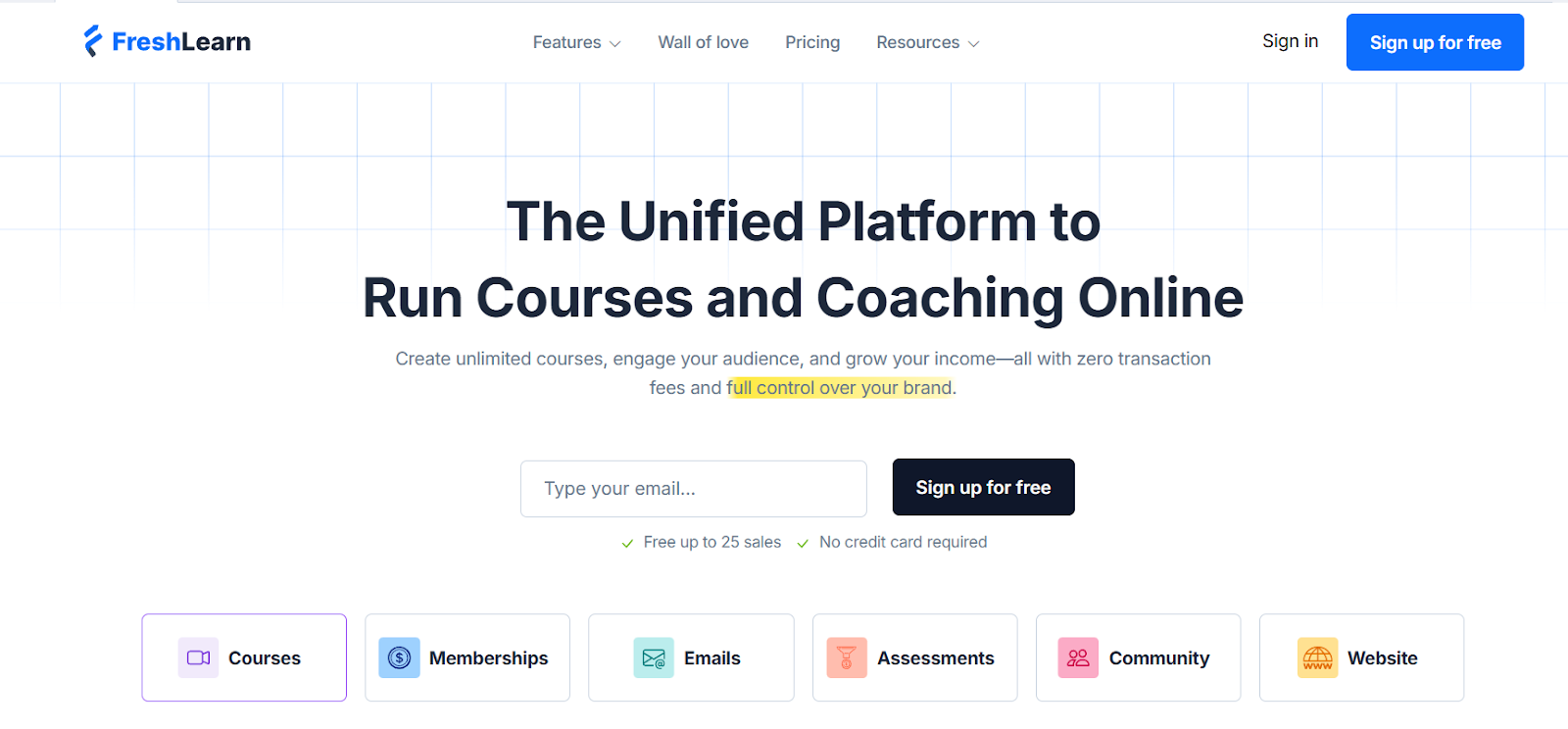
FreshLearn is a creator‑centric learning and commerce suite for courses, cohorts, masterclasses, and digital downloads. It’s built for solo creators, academies, and SMB training businesses that want to launch fast, sell directly, and avoid hidden platform costs.
The platform bundles no‑code authoring, ecommerce, email, coupons, bundles, and landing pages, so you don’t have to stitch tools together or wrestle with plugins.
Key features
- No‑code builder for courses, cohorts, and downloads (drag‑and‑drop, multimedia, drip).
- SCORM support for structured learning, with drag-and-drop file imports.
- Integrated checkout (Stripe/PayPal), coupons, bundles, order bumps, and upsells.
- 0% platform transaction fees (you only pay your payment processor).
- Sales & marketing built in: email broadcasts, coupons, lead capture, and landing pages.
- Community & memberships, live sessions, downloadable resources, and certificates.
- Analytics for revenue, enrollments, and engagement without extra add‑ons.
Which Moodle pain does it solve?
FreshLearn removes plugin and hosting maintenance entirely, replaces the steep learning curve with a guided builder, and bundles reporting/marketing so you aren’t chasing third‑party extensions. For teams selling courses, it addresses the “free isn’t free” TCO problem by eliminating platform transaction fees.
Pricing summary
Free plan for getting started; paid tiers available (monthly, annual, and 2‑year billing options) with 0% platform fees. Confirm exact amounts on the pricing page before publishing.
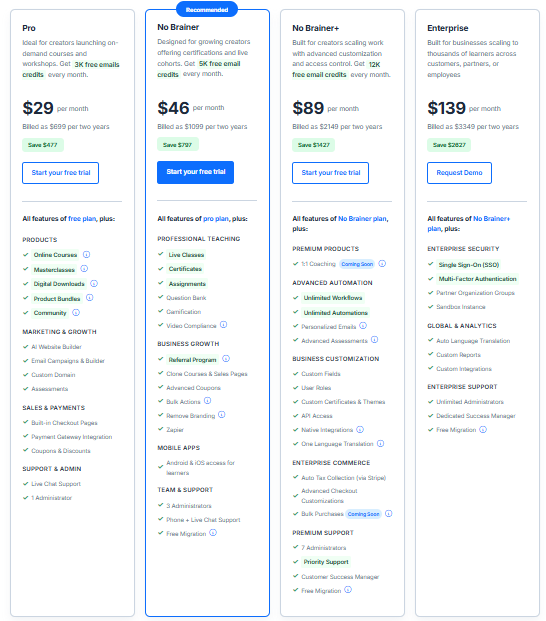
Pros and Cons
Best for
Creators, academies, boot camps, and SMBs that want simple creation and selling without DevOps, plugins, or a marketing Frankenstack.
2) 360Learning
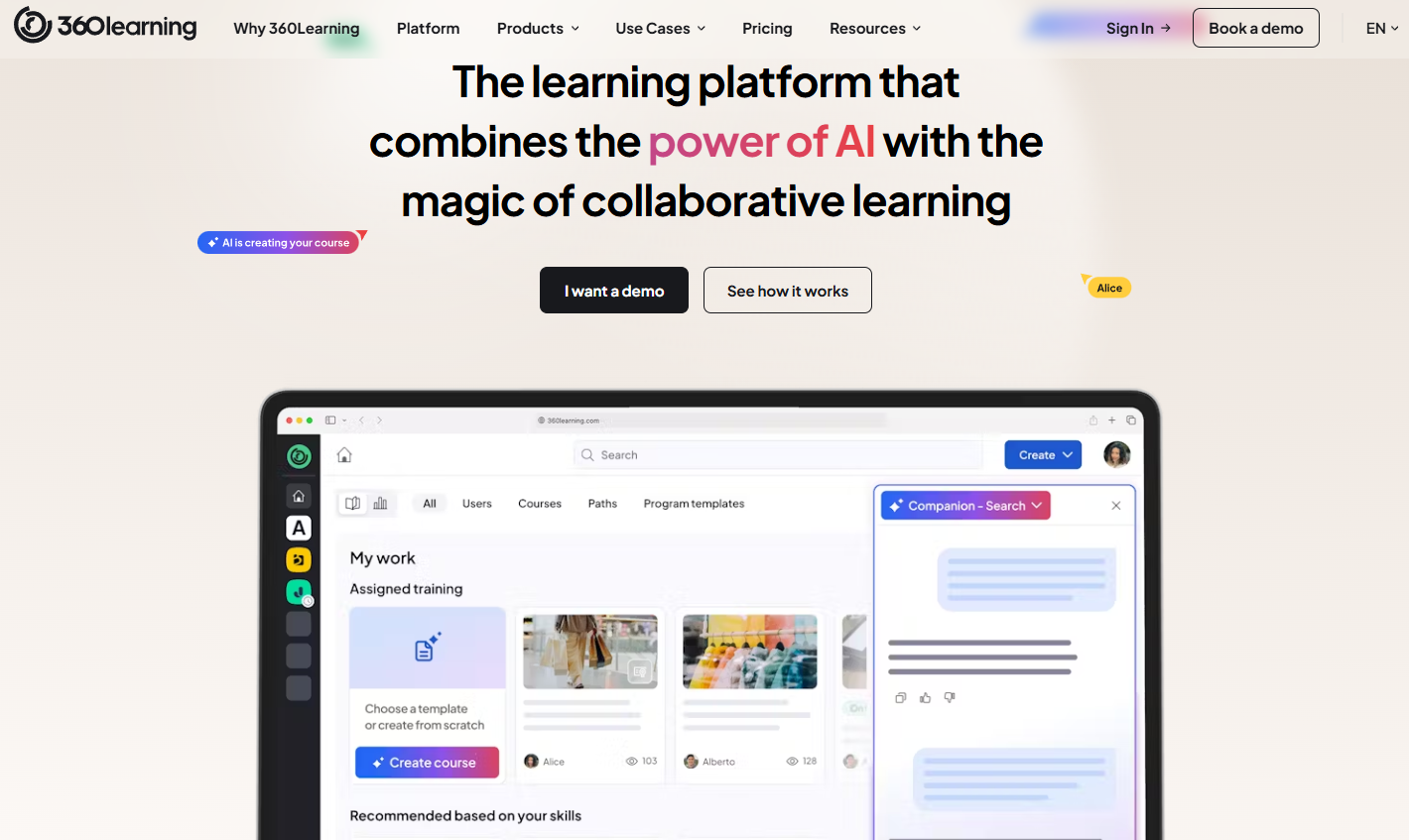
360Learning reframes L&D as a collaborative, bottom‑up process. Subject‑matter experts co‑author courses, peers contribute feedback, and teams iterate quickly.
It’s ideal for high-growth companies and global organizations that want to capture internal knowledge and deliver training continuously, rather than relying on a central team for every course.
Key features
- Collaborative authoring with SME co‑creation, comments, and approvals.
- AI‑assisted authoring to accelerate content drafting and iteration.
- Playbooks for onboarding, product enablement, and compliance at scale.
- Analytics for engagement, completion, and skills impact.
- Integrations with HRIS, SSO, and workplace tools; mobile apps for learners.
- Clear starter Team plan for smaller deployments; enterprise editions for scale.
Which Moodle pain does it solve?
Cuts the admin complexity of course production with structured collaboration; reduces plugin dependency for workflows like reviews/approvals; delivers business‑friendly analytics without cobbling together multiple extensions.
Pricing summary
Transparent Team plan priced per registered/active user (capped seats) for quick starts; Business/Enterprise by quote for larger rollouts. Free trial available.
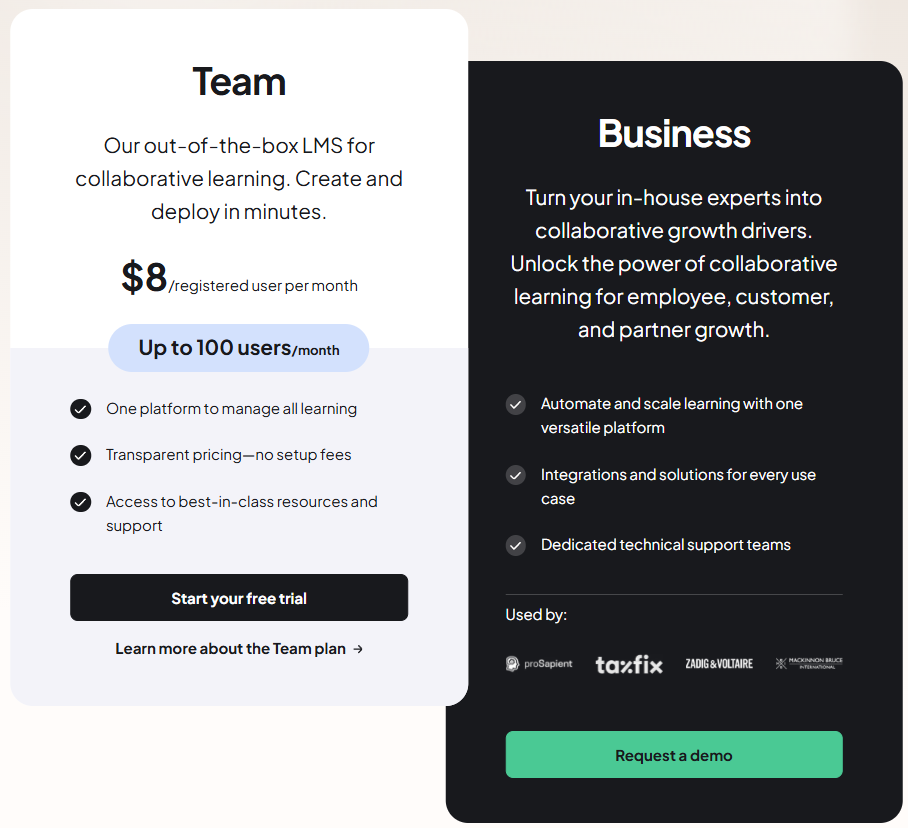
Pros and Cons
Best for
Fast‑moving companies that want a collaborative L&D engine with measurable impact and less dependency on central instructional design bottlenecks.
3) TalentLMS
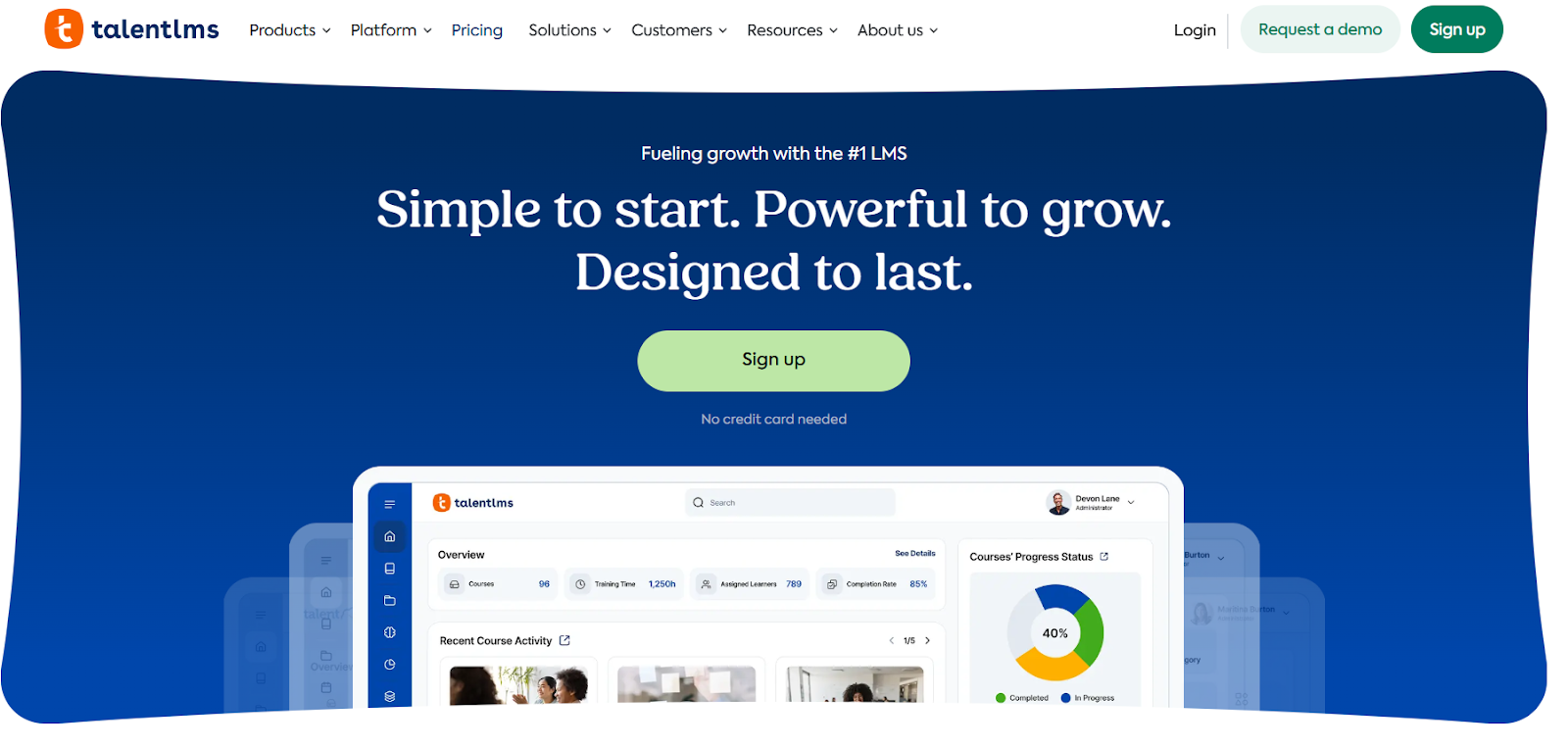
TalentLMS focuses on simplicity, quick rollout, and fair pricing. It’s popular with SMBs, franchise networks, agencies, and training boutiques that need to pilot quickly, keep costs predictable, and roll out core training without heavy implementation overhead.
Key features
- Gamification (points, badges, leaderboards) to motivate learners.
- Clean admin UX; ready‑made templates; SCORM/xAPI support.
- Branches and SSO on higher tiers; native mobile apps for iOS/Android.
- Integrations for HRIS/SSO/payment gateways; multi‑language support.
- Role‑based permissions and basic automations for assignments and reminders.
Which Moodle pain does it solve?
Reduces the steep learning curve with an approachable UI, avoids plugin sprawl by bundling essentials (gamification, mobile, basic analytics), and offers transparent pricing so you can model cost as you scale users.
Pricing summary
Public plans with user‑band tiers (annual discounts). A forever‑free plan supports small pilots (limited users/courses) before upgrading to Core/Grow/Pro tiers for larger teams.

Pros and Cons
Best for
SMBs and distributed operations that want a friendly, low‑overhead LMS with gamification, quick pilots, and predictable costs.
4) Docebo

Docebo is an enterprise learning platform that invests heavily in AI to improve practice, feedback, and personalization. It’s designed for large organizations, partner/customer academies, and regulated industries that need robust analytics, governance, and integrations.
Key features
- AI Virtual Coaching for instant, personalized feedback (e.g., clarity, tone, confidence).
- Skills‑based learning, content curation, and advanced search/discovery.
- Robust analytics and dashboards for stakeholders; rich API/integration catalog.
- Scalable multi‑tenant architectures; strong compliance and security posture.
- Globalization: multi‑language, localization, and accessibility capabilities.
Which Moodle pain does it solve?
Addresses limited built‑in reporting with deep analytics and AI‑driven insights; replaces plugin maintenance with a managed, integrated suite; provides enterprise governance for complex audiences and content models.
Pricing summary
Pricing aligns to Yearly Active Users (YAU) and tier (e.g., Elevate/Enterprise). Quote‑based, with solution packaging and add‑ons as needed.
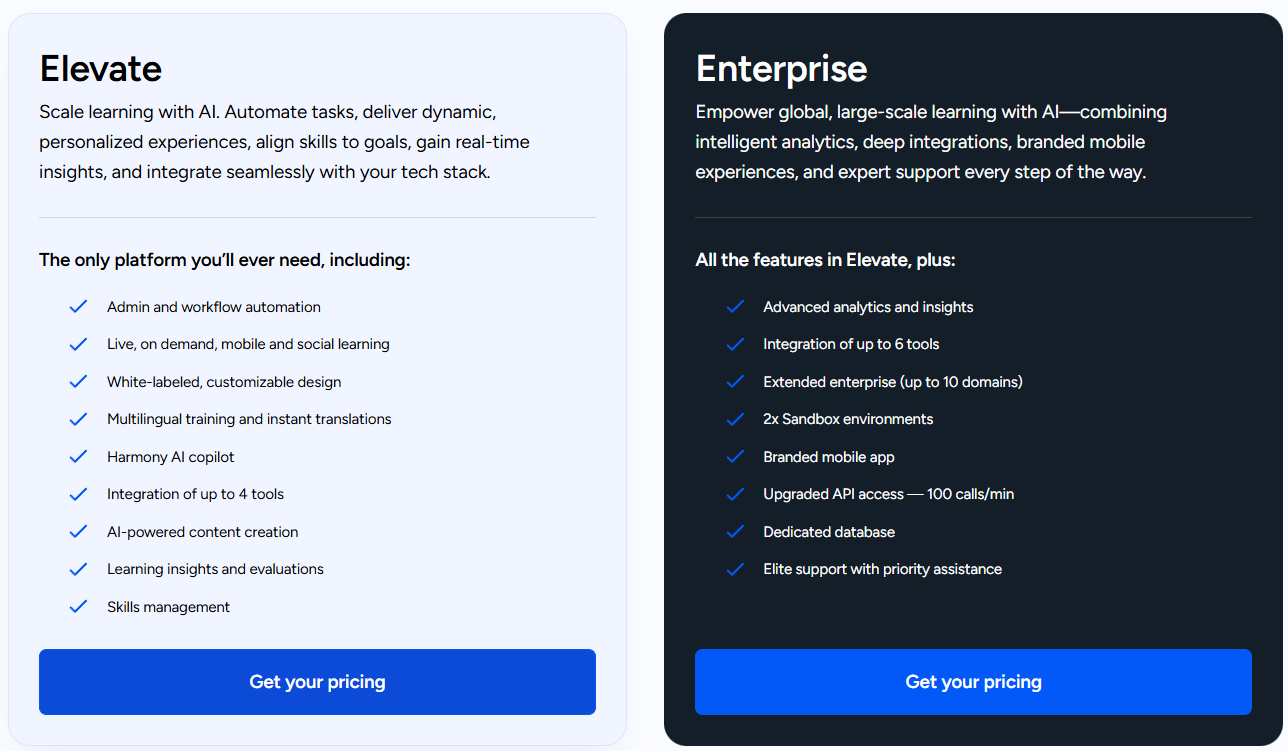
Pros and Cons
Best for
Enterprises prioritizing AI‑assisted skill development and auditable outcomes across employees, partners, and customers.
5) Canvas
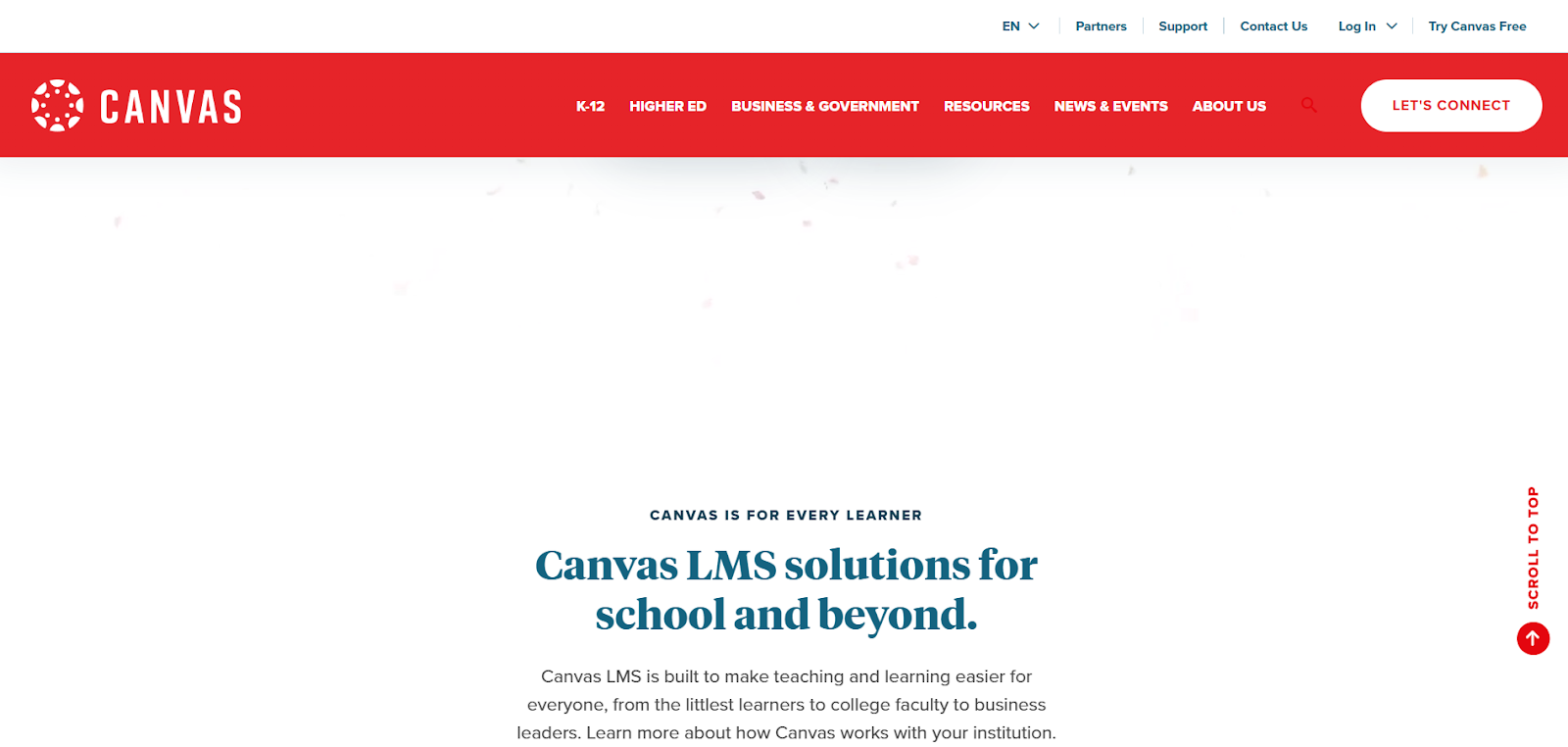
Canvas is a flagship LMS for higher education and K‑12, widely adopted for its robust pedagogy features, SIS/LTI integrations, and strong mobile experience. It also supports individual educators via Free‑for‑Teacher, making it a practical option for faculty running independent or adjunct courses.
Key features
- Assignments, quizzes, discussions, rubrics, and standards‑based gradebook.
- Mastery Paths and outcomes to personalize learning at scale.
- Rich LTI ecosystem; SIS and SSO integrations; mobile apps for teachers/learners.
- Accessibility and compliance features suitable for public institutions.
- Analytics sufficient for academic needs; extensible with institutional BI.
Which Moodle pain does it solve?
Removes hosting/upgrade overhead via a managed service, simplifies mobile delivery without extra plugins, and offers a mature academic feature set that requires less customization for typical HE/K‑12 workflows.
Pricing summary
Free‑for‑Teacher plan for individuals; institutional pricing by quote for schools/districts with SIS/LTI needs.
Pros and Cons
Best for
Universities, colleges, districts, and individual faculty members who want an academically focused LMS with a large ecosystem.
6) Thinkific

Thinkific is a commerce‑ready course platform for edupreneurs and boutique training firms. It combines a branded site builder, communities, and course delivery with a generous 30‑day free trial, useful if you want a full month to validate product‑market fit, branding, and funnels before committing.
Key features
- Website + course builder with themes, sections, and customization.
- Communities and memberships to increase retention and LTV.
- Subscriptions, bundles, and flexible checkout for recurring revenue.
- Integrations and apps to extend marketing, analytics, and CRM.
- Emerging AI tools to speed content creation and structure.
Which Moodle pain does it solve?
Removes setup complexity (no servers/plugins), delivers built‑in commerce so you aren’t gluing together carts/pages, and provides simple analytics to track revenue and engagement without external BI on day one.
Pricing summary
No perpetual free plan; instead, a 30‑day free trial across the platform. Common paid tiers cluster around entry/mid/advanced levels. Verify current price points at publish time.
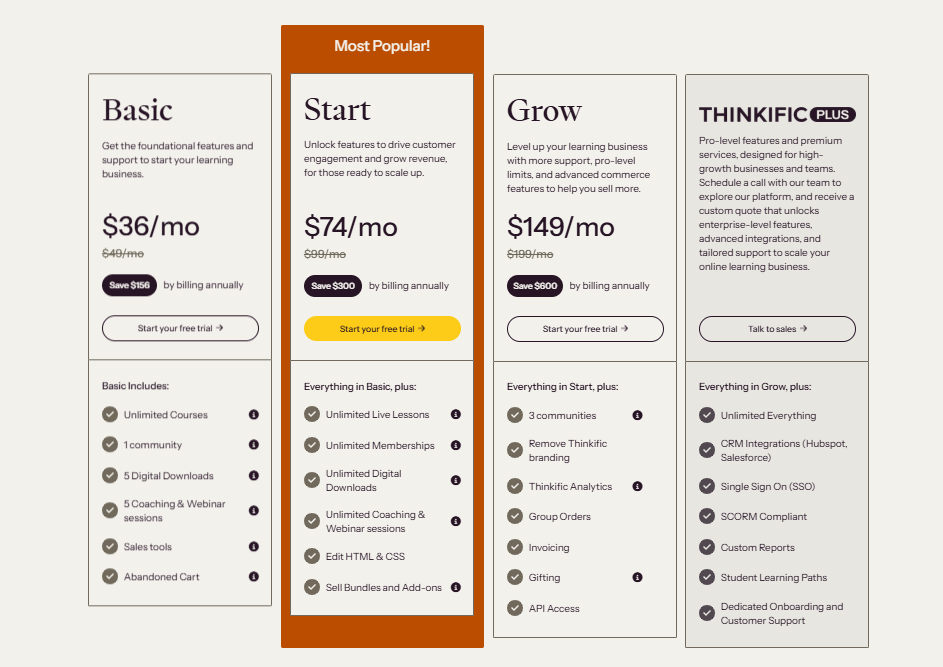
Pros and Cons
Best for
Professional course entrepreneurs who need a branded storefront, communities, and recurring revenue without heavy engineering.
7) Absorb LMS
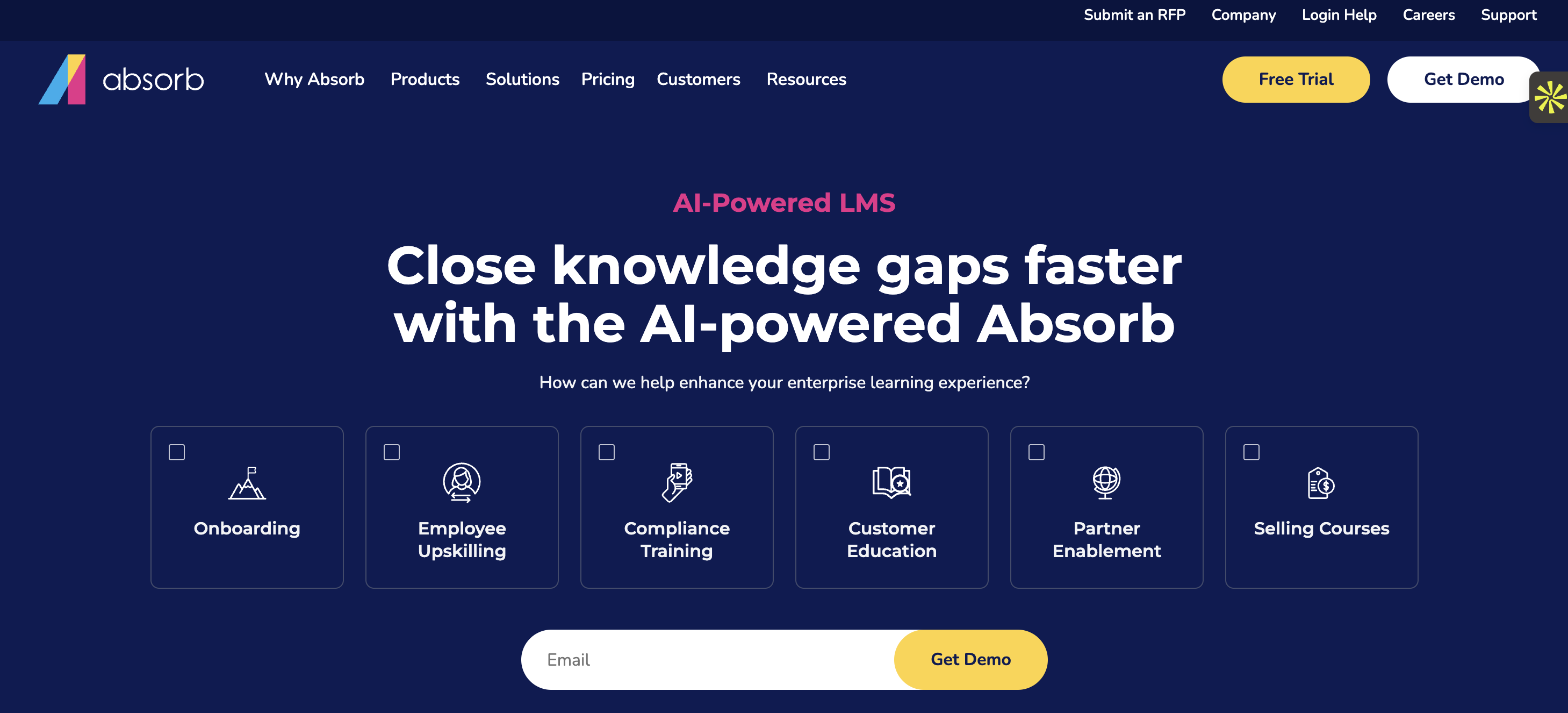
Absorb targets corporate L&D programs that need robust automation, reporting, and global scale. It fits regulated industries, channel/partner training, and organizations standardizing complex curricula across multiple audiences or brands.
Key features
- Powerful automations (rules, enrollments, reminders) and role‑based admin.
- Multi‑tenant options for external audiences; branded portals and e‑commerce.
- Robust analytics and dashboards; SCORM/xAPI and content library add‑ons.
- Rich integration catalog (HRIS, SSO, payments) and professional services.
- Trial access to experience the platform hands‑on.
Which Moodle pain does it solve?
Replaces DIY plugin stacks with managed, enterprise‑grade capabilities; strengthens reporting for compliance and leadership; lowers maintenance by shifting updates/support to the vendor.
Pricing summary
Pricing by quote with a free trial available to validate fit and features before purchase.
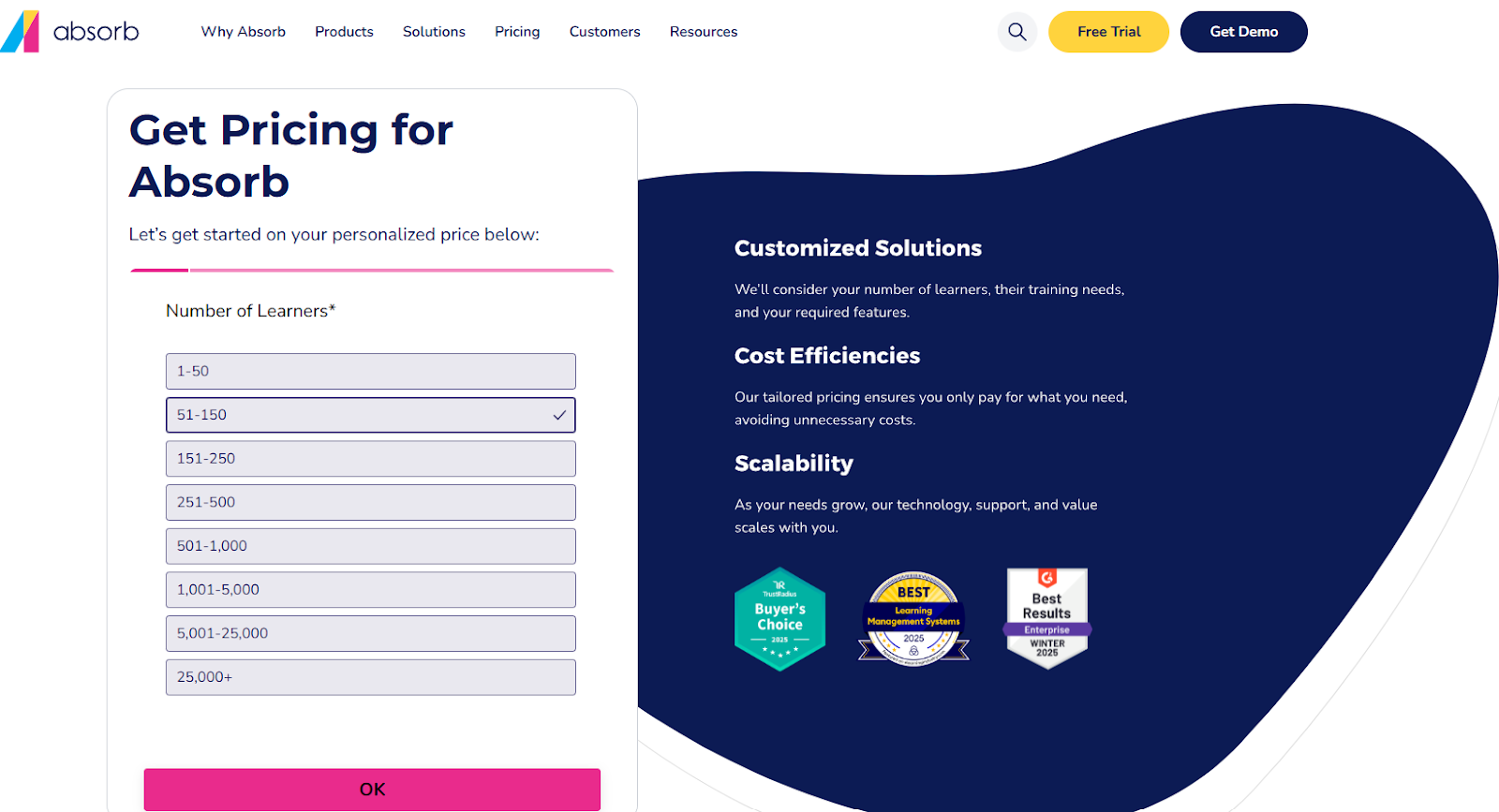
Pros and Cons
Best for
Enterprises with automation/compliance needs, multiple brands/audiences, and leadership demands for auditable reporting.
8) D2L Brightspace
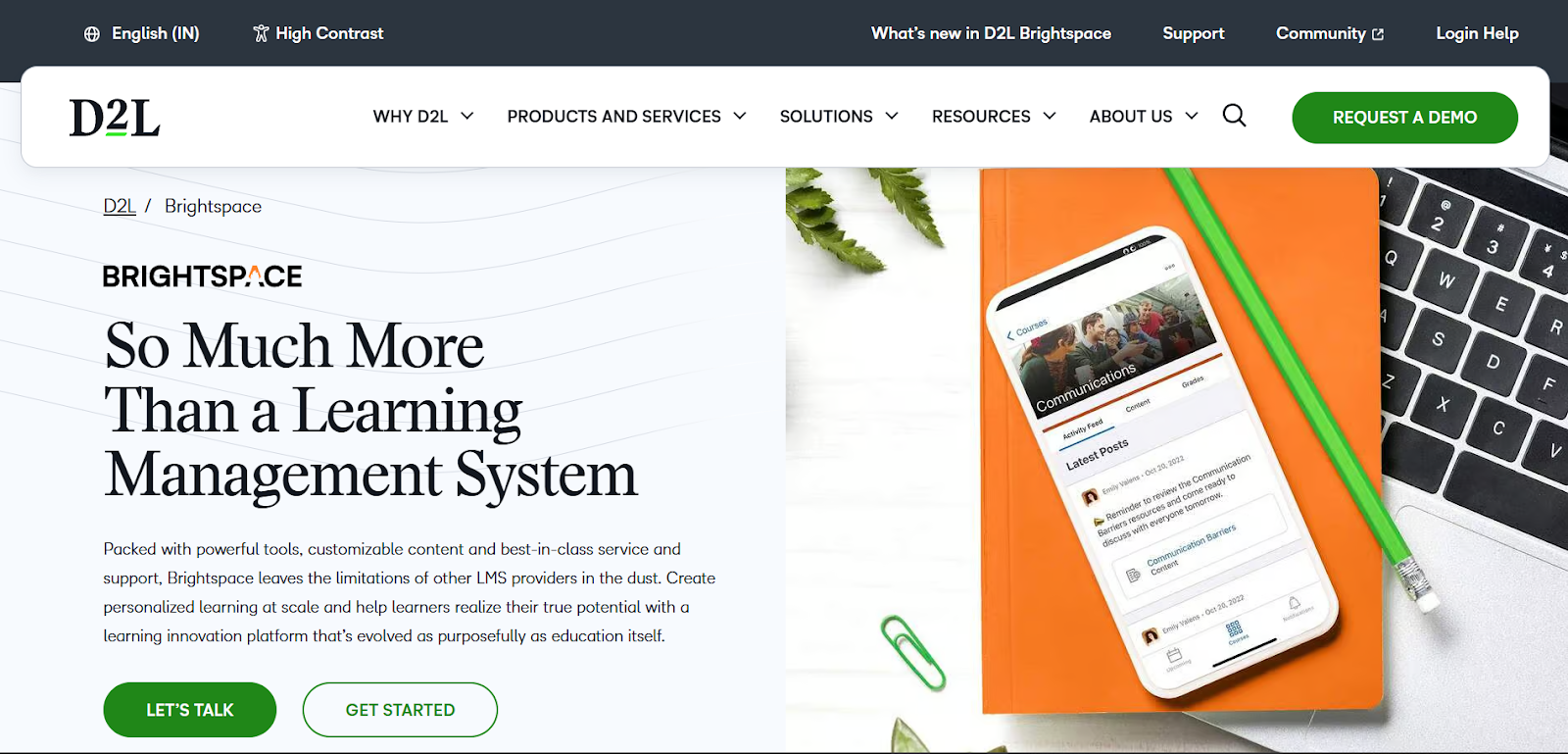
Brightspace serves higher education and enterprise customers who care deeply about assessment rigor, accessibility, and data‑driven improvement. It’s widely used by universities and corporate learning teams with formal competency models.
Key features
- Competency‑based learning, question banks, and mastery‑aligned assessments.
- Strong accessibility and UDL (Universal Design for Learning) features.
- Advanced analytics and early‑alert tooling for student success.
- Integrations with SIS/HR systems; SCORM/xAPI; mobile‑ready experiences.
- 30‑day free trial to explore features hands‑on.
Which Moodle pain does it solve?
Provides deeper assessment/analytics without hunting add‑ons; vendor‑hosted delivery reduces maintenance; institutional integrations minimize custom plumbing.
Pricing summary
Pricing by quote for institutions and enterprises; 30‑day free trial offered for evaluation.
Pros and Cons
Best for
Universities and enterprises prioritize assessment rigor, accessibility, and measurable learner success.
9) SAP Litmos
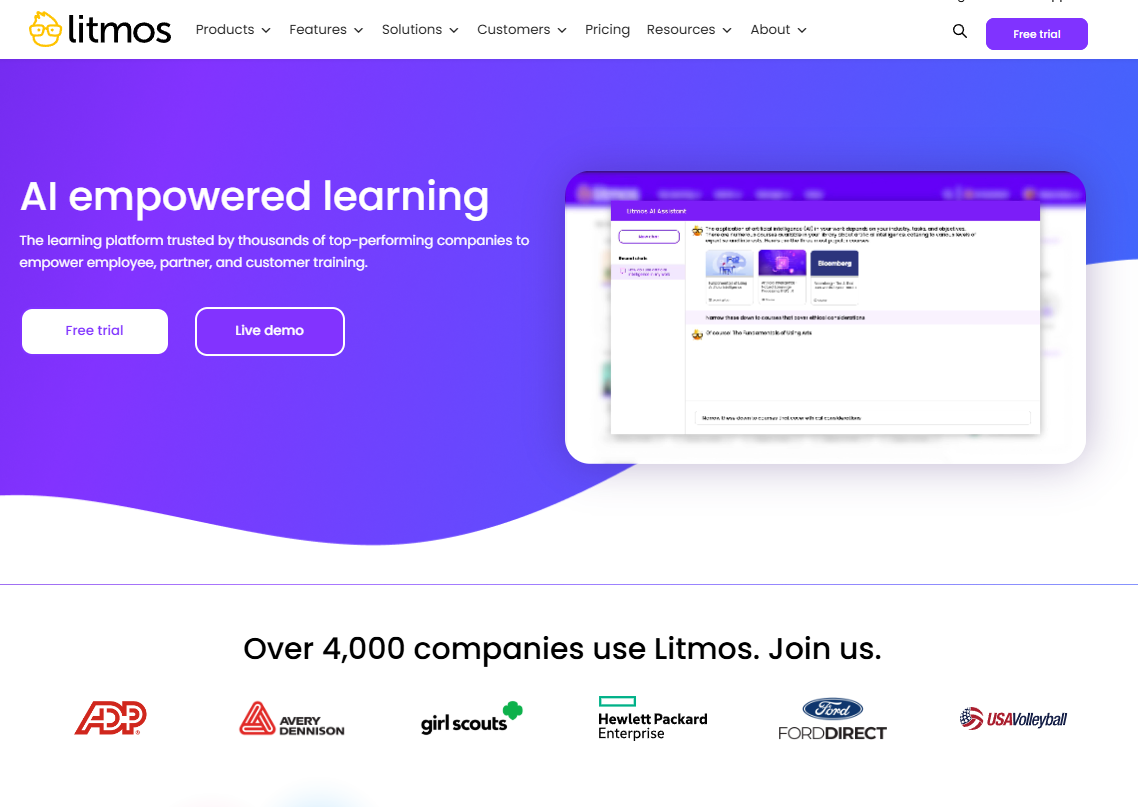
Litmos pairs an easy‑to‑administer LMS with one of the largest ready‑made course libraries, making it appealing when speed matters—onboarding, compliance refreshers, and foundational skills. The platform’s newer AI authoring options help teams produce content faster without external tools.
Key features
- Rapid deployment, intuitive UI, and branded learner portals.
- Packaged course library for instant curricula (safety, compliance, soft skills).
- AI content authoring is available on select packages.
- Automations for assignments, reminders, and certification tracking.
- SSO/HRIS integrations; mobile apps; basic commerce for external audiences.
Which Moodle pain does it solve?
Reduces time‑to‑value by bundling content and delivery; avoids plugin hunts for libraries and reporting; lowers maintenance via a hosted service with guided onboarding.
Pricing summary
Pricing by quote with a 14‑day free trial so teams can validate workflows, authoring, and library fit before buying.
Pros and Cons
Best for
Operations‑minded teams needing quick deployment + ready‑made courses for compliance and baseline skills.
10) Odoo eLearning
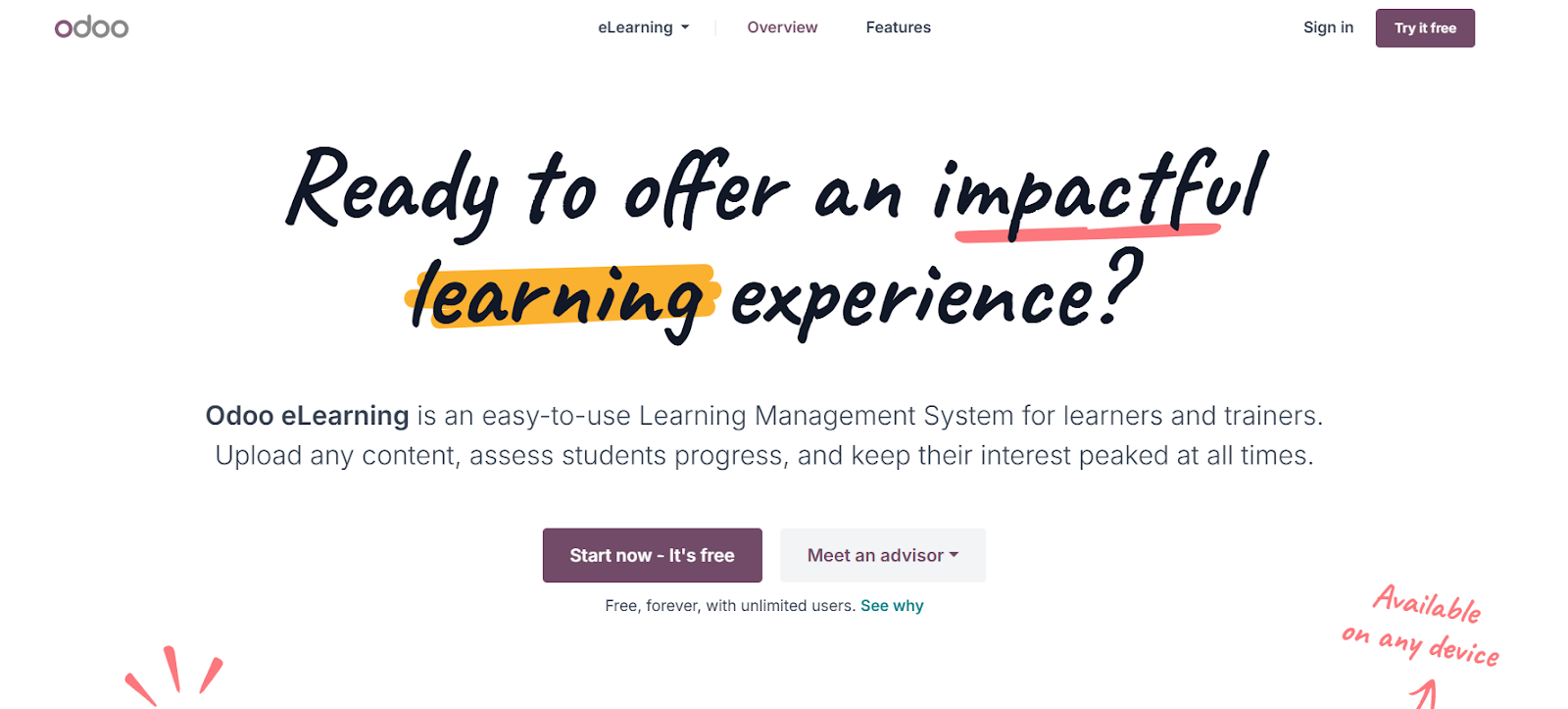
Odoo eLearning is an LMS module in the broader Odoo suite (CRM, HR, Projects, Inventory, etc.). If your organization already runs Odoo, eLearning lets you deliver training within the same data model, streamlining user management, reporting, and process automation across departments.
Key features
- Native integration with Odoo apps (HR, CRM, Projects, Finance).
- Course, quiz, forum, and certification features; SCORM support.
- Community (open‑source) and Enterprise (subscription) editions.
- Deployment options: self‑hosted, managed Odoo.sh, or partner‑hosted.
- E-commerce and website modules to publish catalogs for external audiences.
- Role‑based access control and extensibility via modules.
Which Moodle pain does it solve?
Solves integration and reporting headaches by living inside your ERP/CRM; reduces maintenance if you opt for vendor‑managed hosting; lowers total tool count for internal enablement and partner certification.
Pricing summary
Community edition is free (self‑hosted). Enterprise uses per‑user subscription pricing; hosting (e.g., Odoo.sh) is additional. Budget for implementation/partner services if you customize.
Pros and Cons
Best for
Organizations already on Odoo that want training embedded in operations (HR onboarding, CRM‑linked enablement, partner certification).
11) ELMO LMS

ELMO is an Australia‑born HR suite with an LMS component. It suits mid‑market organizations in Australia/New Zealand that want HR, payroll, recruitment, and learning from a single vendor, simplifying compliance and centralizing employee data.
Key features
- HRIS, payroll, recruitment, performance, plus LMS in the same platform.
- Course builder, SCORM import, quizzes/assessments, and certificates.
- Compliance management and reporting are aligned to HR workflows.
- Branding/customization, SSO, and analytics for HR & L&D stakeholders.
- Localized support and a strong ANZ customer base.
Which Moodle pain does it solve?
If your priority is HR + LMS unification, ELMO reduces integration overhead, streamlines user provisioning, and consolidates reporting, with less plugin plumbing and fewer vendors to manage than a DIY Moodle stack.
Pricing summary
Pricing by quote (module‑based and company‑size dependent). Public catalogues rarely list a free trial; expect a sales‑led evaluation with demos and scoping.
Pros and Cons
Best for
ANZ organizations want HRIS + LMS with compliance and centralized records across the employee lifecycle.
Decision framework: Selecting an alternative to Moodle
Use this structured flow to narrow options from longlist → shortlist → winner. It is budget‑aware, tech‑reality‑aware, and works for schools, enterprises, and creator businesses.
Clarify goals and constraints
- Primary goal: Internal employee training, higher‑ed delivery, partner/customer academies, or course sales?
- Content format: SCORM/xAPI, video, interactive assessments, communities, cohorts/live sessions.
- Scale & growth: Current learners, expected 12–24‑month growth, number of authors/admins.
- Compliance: Do you need certifications, audits, and granular reporting?
- Support model: Do you have in‑house IT (okay with open‑source) or prefer vendor‑hosted with SLAs?
Must‑have checklist
Keep only platforms that check these boxes:
Ease of use for non‑technical admins and instructors.
Hosting & maintenance model that fits your team (fully hosted vs. self‑hosted).
Assessments & reporting that meet your accreditation or leadership standards.
Integrations (SSO, HRIS/SIS, CRM, payments) that already exist or are easy to add.
Security & privacy: SSO/MFA, role‑based access, audit logs, GDPR readiness, data residency if needed.
Mobile experience (native apps, offline if necessary).
Budget fit (transparent pricing or clear quote logic).
Shortlist 3–5 tools by use case
- Creators/academies (sell courses): FreshLearn, Thinkific.
- Collaborative corporate learning: 360Learning.
- SMB training with gamification & value: TalentLMS.
- Enterprise AI, governance, multi‑tenant: Docebo, Absorb LMS, SAP Litmos.
- Higher education: Canvas, D2L Brightspace.
- ERP‑connected enablement: Odoo eLearning.
- HR + LMS in one (ANZ): ELMO LMS.
Weighted‑score evaluation
Create a simple matrix (0–5 per criterion). Multiply by weights. Example weights (adjust to your reality):
Tip: Involve one admin, one instructor/SME, and one stakeholder. Have each score independently, then average for a fairer outcome.
TCO snapshot (avoid surprises)
Estimate 12–24‑month cost per platform:
- Subscription (license or per‑user), including any content libraries.
- Implementation (setup, migration, integrations, design).
- Operations (admin hours/month, support contracts).
- Payments (creator commerce: processor fees; check platform fees = 0% vs. 5–15%).
- Add‑ons (advanced analytics, custom SSO, extra portals, branded apps).
Pilot with real content (2–4 weeks)
- Import one real course (SCORM/common cartridge or video + quizzes).
- Set up SSO/integrations in a basic way.
- Enroll a small learner cohort; run a sprint (onboarding + one assessment).
- Capture admin time, learner completion, support tickets, and stakeholder feedback.
Migration plan (if moving from Moodle)
- Inventory: Courses, question banks, certificates, users, groups, enrollments, and historical data.
- Export: SCORM/IMS or common cartridge where possible; otherwise, re‑author high‑value modules.
- Map: Roles/permissions, grading logic, certificates, and automations.
- Phased cutover: Start with new cohorts; then migrate evergreen courses; archive the rest.
- QA & comms: Sandbox tests, change‑log, and learner comms (email + in‑app tour).
Red flags (pause and re‑check)
- Pricing is hard to model beyond year one.
- Missing SSO or integration is a table-stakes consideration.
- Analytics cannot answer your quarterly KPI questions.
- No clear SLA or support path for your region/time zone.
- The vendor cannot provide references for a similar customer profile.
Maximize your course creation potential with the right Moodle Alternative
Moodle’s flexibility is undeniable, but many teams now prioritize speed, simplicity, and built-in analytics over DIY maintenance. The alternatives we explored, 360Learning, TalentLMS, Docebo, Canvas, Thinkific, Absorb LMS, D2L Brightspace, SAP Litmos, Odoo eLearning, and ELMO LMS, all solve different pain points, from collaborative corporate learning to higher education ecosystems, automation-heavy compliance, and HR-suite integration.
But if your need is broader, building, marketing, and selling courses under one roof with SCORM support and zero hidden costs, FreshLearn shines. Unlike other platforms, it combines no-code course creation, built-in marketing, community tools, and 0% transaction fees, so every dollar you earn goes straight to you.
You’ve seen the options. If what you want is an all-in-one platform that removes complexity and maximizes margins, FreshLearn is the clear next step.
Launch your next course in hours, not weeks.
Create your free FreshLearn account now!
FAQs
1. Can I switch from Moodle without losing my course content?
Yes, export SCORM/IMS where possible. Rebuild complex quizzes natively. Migrate in phases. Keep Moodle read-only temporarily. On FreshLearn, re-author key modules in the no-code builder to avoid plugin overhead.
2. Open‑source vs. cloud LMS: which is better for 2025?
Open-source = control but ongoing hosting, upgrades, and plugins. Cloud = faster launch, bundled security/support, predictable TCO. Choose by IT capacity and customization needs.
3. How do alternatives handle reporting?
They ship business-ready dashboards, exports, and APIs. Enterprise tools add certifications and multi-tenant roll-ups. FreshLearn includes revenue, enrollment, and engagement analytics out of the box.
4. What should I know about SSO, roles, and user management?
Verify SSO (SAML/OAuth), automated provisioning from HRIS/SIS, and role-based permissions for admins, graders, instructors, and observers. For external training, ask about multi-tenant portals and delegated admin. Confirm audit logs, SCIM support, and MFA. Clear identity and roles will reduce support tickets and strengthen compliance.



